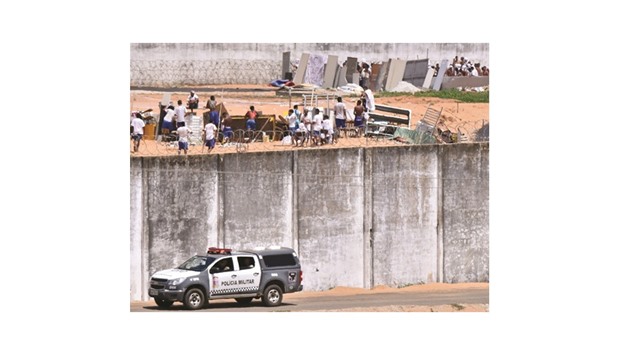Brazilian police used rubber bullets and tear gas yesterday to break up a renewed clash between drug gangs in a prison where 26 inmates were butchered by rivals in recent days.
Major Eduardo Franco, spokesman for police in the state of Rio Grande do Norte where the Alcaçuz prison is located, said authorities managed to keep the rival gangs apart and so far prevent another massacre.
Brazil has been hit by a wave of deadly gang clashes in prisons in the north and northeast regions of the country since January 1.
At least 140 inmates have been killed in the intense violence.
Security officials said members of Brazil’s most powerful drug gang, the First Capital Command (PCC), who last Saturday started a riot in Alcacuz and murdered 26 members of a rival gang, many of whom they beheaded, tried to invade their enemies’ prison wing again early yesterday afternoon.
Images broadcast live on Globo TV showed prisoners from both the PCC and the local gang “Crime Union of RN” — RN being the Portuguese initials for Rio Grande do Norte state — atop the roofs of their respective wings, waving banners with gang insignia and wielding knives, clubs and other homemade weapons.
Scores of prisoners were seen running free within the prison — clearly indicating that security officials did not have control of the prison, which Franco said they had regained on Monday night.
On January 1, the powerful North Family gang, which largely controls a lucrative cocaine drug route along the Solimoes River in the Amazon that flows into Colombia and Peru, the world’s top two cocaine-producing nations, killed 56 inmates at a prison in Amazonas state, mostly PCC members.
The PCC retaliated on January 6 by killing 33 inmates at the Monte Cristo prison in the Amazonian state of Roraima, before carrying out the most recent killings this past weekend.
The clashes are the result of a split between the PCC and Brazil’s second-most powerful gang, the Rio de Janeiro-based Red Command.
For more than 20 years the two gangs maintained an uneasy working relationship, ensuring that a steady flow of drugs and arms easily made its way over Brazil’s porous borders with cocaine and marijuana-producing nations.
But about six months ago, security officials and experts say, the PCC moved to assume full control over trafficking routes and tried to push the Red Command aside.
The Red Command responded by forming alliances with smaller regional gangs — including the North Family and Crime Union of RN.
Yesterday, members of the Crime Union of RN climbed atop a roof at the Alcacuz prison and waved large handmade flags bearing the acronyms not only of their gang but also of the Red Command and the North Family, underscoring their allegiance.
Brazil’s 1,400 prisons — badly overcrowded and for decades the source of sharp criticism for medieval conditions and human rights abuses — are largely under the control of state governments, which seem unable to stop the gang war.
Authorities have started transferring the leaders of the uprisings to undisclosed prisons where they are placed in isolation.

Police car drives past the wall of Alcacuz prison while inmates from different gangs protect themselves during an uprising, in Natal, Rio Grande do Norte state, Brazil, yesterday.
